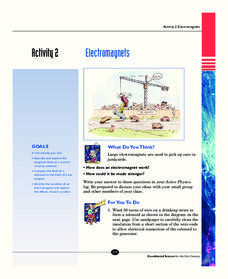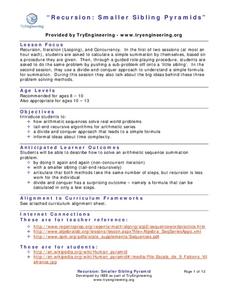Curated OER
The Imperfect (Past) Subjunctive: How?
Teach your class how to form the imperfect subjunctive. Included here is information on and examples of regular imperfect subjunctive verbs, irregular imperfect subjunctive verbs, and imperfect subjunctive -se endings displayed in long...
Laura Candler
Goal Tracker Booklet
Turn your class into a group of self-motivated learners with this goal setting resource. Children will take ownership over their own education as they set goals for themselves and reflect on their progress, creating a record...
Syracuse City School District
Capitalization and Punctuation
How many of the pupils in your language arts class can differentiate between a colon and a semicolon? Clarify common conventions, including end punctuation, proper capitalization, and sentence structure, with a series of helpful grammar...
National Institute of Open Schooling
Ionic Equilibrium
Scientific studies show the older we get, the more acidic we become. The activity extensively teaches high schoolers about acids and bases. By the end of the 14th installment of 36, they can define and explain three concepts of...
National Institute of Open Schooling
Electrochemistry
In an electrolytic cell, electrical energy is converted into chemical energy, the exact opposite of a battery! Lesson 15 in a series of 36 explores electrochemistry. Participants begin by reading and discussing oxidation/reduction...
Curated OER
Finance Formulas Review Sheet
Keep your finances straight—more like finance formulas straight—with a well-organized formula guide full of everything you need. Starting with simple interest and ending with future and present value, this sheet can be...
Del Mar College
Solving Systems of Equations
Lets keep the system working and show learners the three ways to solve linear systems of equations. Each method includes step-by-step instructions to work their way through the problem. The same problem is used for each method to show...
Mt. San Antonio Collage
Quadratic Functions and Their Graphs
Starting with the basics, learners discover the features of a parabola and the ways to accurately graph it. After pupils practice with graphing, the end of the worksheet focuses on application type problems.
Curated OER
The Imperfect Tense
Take a trip to the computer lab or flip your class and use this online resource. Spanish language learners can read the included information about the imperfect and practice with the online interactive exercises that are linked on the...
It's About Time
Sounds in Strings
How many of your pupils play an instrument? A musical science lesson will help all of them understand how string instruments work. Young scientists construct a string-and-pulley system to test frequency and pitch. The lesson...
It's About Time
Electromagnets
Young scientists build their own electromagnet and test it by picking up paperclips. Analysis questions evaluate knowledge at the end of the activity.
San José State University
Possessive Apostrophes
A great review of possesive nouns and how to add apostrophes. Clearly demonstrating where to place the apostrophe for different nouns, the resource also notes some tricky exceptions. Reinforce the concept with a little practice putting...
Curated OER
My Antonia: Concept Analysis
Use this analysis of My Antonia to help inform your instruction and prepare your pupils for the project and enrichment ideas listed at the end of the resource. The analysis covers big questions related to the text, themes, plot elements,...
TryEngineering
Recursion: Smaller Sibling Pyramids
Get siblings to do your work. Scholars learn how to perform summations of arithmetic sequences in an innovative lesson plan. They use iterations, smaller siblings (tail-end recursion), and the divide-and-conquer approach.
Curated OER
Using Por and Para
Clear up confusion around por and para. These words can be very difficult, especially for learners who are native English speakers. The information section describes when to use each word and provides examples of specific situations....
National Institute of Open Schooling
Nomenclature and General Principles
Carbon, the base for all organic compounds, exists in nature in its purest form as graphite or diamonds. The 25th lesson in a series of 36 teaches pupils the nomenclature of organic compounds. Learners read about how to use the IUPAC...
National Institute of Open Schooling
Chemical Thermodynamics
All chemical reactions require energy. To explore thermodynamics, classes read and discuss its laws, exothermic and endothermic reactions, enthalpy in many forms, calculate enthalpy problems, and use Hess' Law to calculate enthalpy of a...
Houghton Mifflin Harcourt
Simple and Compound Interest
Your learners will get lots of practice calculating simple and compound interest by the end of this lesson. Simple explanations and examples lead learners through the concepts and steps of calculating simple and compound interest...
Houghton Mifflin Harcourt
Around Town: Neighborhood and Community: English Language Development Lessons (Theme 3)
Here is a unit designed to support English language development. Scholars speak, move, and write to learn more about topics that focus on community and local concepts. The series of lessons aids to reinforce concepts...
Towson University
The Wildlife Forensics Lab
Can science put an end to the poaching of endangered species? Show your young forensic experts how biotechnology can help save wildlife through an exciting electrophoresis lab. Grouped pupils analyze shark DNA to determine if it came...
Curated OER
Beginner's Guide to Arabic
Introduce your language learners to Arabic. The most useful portion of this resource is the detailed information on the Arabic alphabet. Each letter is placed in a grid that shows the various ways to write it based on the situation...
Blogger
Help with Reading
Children's education doesn't have to end when they leave the classroom. Support parents with imporving their children's reading comprehension skills at home with this list of guiding questions.
Road to Grammar
Mastering the Present Perfect Tense
You have found a solid resource for covering the present perfect tense. Starting with explanation and examples, this resource moves quickly into a series of exercises that target specific elements of the present perfect...
Curated OER
Conjugating Verbs in Spanish
It's time to conjugate! If your class doesn't really know what that means, use the materials provided here to build understanding. The resource covers verbs, infinitives, the different Spanish verb endings, conjugation in the present...
Other popular searches
- Inflectional Endings
- Inflected Endings
- Ing Endings
- Alternate Ending
- Er and Est Endings
- Word Endings
- Different Story Endings
- Base Words With Endings
- Plural Endings
- Adding Ed Ending
- Ed Endings
- Ed, S, Ing Endings























